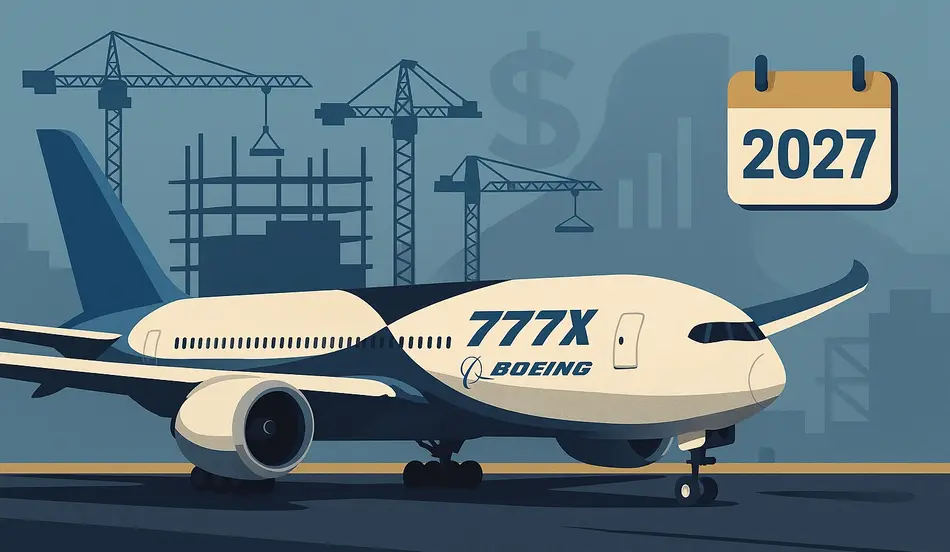Boeing 777X: The Shocking Delay That’s Shaking the Aviation World
The aviation industry is no stranger to turbulence, but the latest news about the Boeing 777X has sent shockwaves through airlines, investors, and travelers alike. The much-anticipated aircraft, which was initially expected to take to the skies in 2020, has now been pushed back yet again, with commercial flights not expected until 2027. This delay is more than just a scheduling hiccup—it’s a development with far-reaching consequences for Boeing, its customers, and the entire aviation sector.
A Timeline of Delays and Disappointment
When Boeing first announced the 777X, it was hailed as a game-changer for long-haul travel. Airlines placed their orders with high hopes, expecting to offer passengers a new level of comfort and efficiency. However, the journey from concept to commercial flight has been anything but smooth.
The Initial Promise
The Boeing 777X was designed to be the world’s largest and most efficient twin-engine jet, boasting advanced aerodynamics, new engines, and a spacious cabin. Airlines and passengers alike were eager for its debut, anticipating a new era in air travel.
Setbacks Begin to Mount
Despite the initial excitement, the 777X program soon encountered a series of setbacks:
- Certification Issues: Regulatory hurdles have proven more challenging than anticipated, with authorities demanding rigorous testing and documentation.
- Production Challenges: Manufacturing such a complex aircraft has led to unexpected delays and technical problems.
- Financial Strain: Each delay has added to Boeing’s financial woes, with the company facing the possibility of a non-cash accounting charge between $2.5 and $4 billion.
Inside Boeing: Leadership and Communication
Boeing’s leadership has not shied away from acknowledging the difficulties. CEO Kelly Rotberg, speaking at a recent Morgan Stanley conference, openly discussed the “mountain of certification issues” facing the company. This candid communication may have been an attempt to prepare stakeholders for more bad news, and it appears that more challenges are indeed on the horizon.
The Impact on Customers
For airlines that have been waiting since 2020, the latest delay is a significant blow. Many have built their future route plans and fleet upgrades around the 777X, and the continued uncertainty is forcing them to reconsider their strategies. Some may need to extend the life of older aircraft, while others might look to competitors for alternative solutions.
Financial Repercussions
The financial impact of the delay cannot be overstated. In addition to the potential accounting charge, Boeing’s reputation has taken a hit, and investor confidence has been shaken. The company’s upcoming earnings announcement at the end of October is expected to shed more light on the situation, but for now, uncertainty prevails.
Navigating Aerospace Challenges
Boeing’s struggles highlight how leadership, communication, and resilience are critical in times of uncertainty. Employers across industries can strengthen their organizations by hiring skilled talent ready to restore trust, manage crises, and drive innovation. Post your job on WhatJobs today and connect with professionals prepared to take on high-stakes challenges.
Post a Job Free for 30 Days →Why Is the Boeing 777X Delay So Significant?
The delay of the Boeing 777X is not just a problem for Boeing—it’s a setback for the entire aviation industry. Here’s why:
A Ripple Effect Across the Industry
- Airlines: Must adjust their fleet plans, potentially incurring higher costs and operational inefficiencies.
- Passengers: May face fewer options for long-haul travel and delayed access to improved comfort and amenities.
- Suppliers: Experience disruptions in their own production schedules and revenue streams.
Regulatory Scrutiny
The aviation industry is heavily regulated for good reason—safety is paramount. However, the increased scrutiny on Boeing following previous incidents has made the certification process for the 777X even more rigorous. While this ensures a safer product, it also contributes to longer delays.
Looking Ahead: What’s Next for Boeing and the 777X?
Boeing is working tirelessly to address the challenges facing the 777X program. The company is collaborating closely with regulators, investing in additional testing, and making necessary adjustments to its production processes. While the road ahead is uncertain, Boeing remains committed to delivering the 777X and restoring its reputation as a leader in aviation innovation.
Potential Silver Linings
While the delay is undoubtedly frustrating, it may ultimately result in a safer, more reliable aircraft. By taking the time to address every issue thoroughly, Boeing can ensure that the 777X meets the highest standards of safety and performance.
What Should Airlines and Passengers Expect?
- Short-Term: Continued reliance on existing aircraft and possible adjustments to flight schedules.
- Long-Term: The eventual introduction of the 777X, offering improved efficiency, comfort, and range.
Minimal Bullet Points: Key Takeaways
- The Boeing 777X’s commercial debut is now expected in 2027, seven years after the original target.
- Airlines and passengers face continued uncertainty and operational challenges.
- Boeing’s financial health and reputation are under intense scrutiny.
- Regulatory and production hurdles remain the primary obstacles.
Frequently Asked Questions
What is the Boeing 777X and why is its delay significant?
The Boeing 777X is Boeing’s latest long-haul, twin-engine jet, designed to set new standards in efficiency and passenger comfort. Its delay is significant because it impacts airlines’ fleet plans, disrupts travel schedules, and affects Boeing’s financial stability and reputation.
How will the Boeing 777X delay affect airlines and passengers?
The Boeing 777X delay forces airlines to adjust their fleet strategies, potentially leading to higher operational costs and fewer options for passengers. Travelers may experience limited choices for long-haul flights and delayed access to new amenities.
What are the main reasons behind the Boeing 777X delay?
The Boeing 777X delay is primarily due to regulatory certification challenges, production issues, and financial pressures. Increased scrutiny from aviation authorities has extended the timeline for commercial launch.
When is the Boeing 777X now expected to enter commercial service?
Boeing has communicated that the Boeing 777X is now expected to begin commercial flights in 2027, a significant postponement from the original 2020 target.
Live Example: A User’s Perspective
Imagine you’re an airline executive who planned to upgrade your fleet with the Boeing 777X. You’ve spent years preparing for its arrival, only to face repeated delays. Each postponement means reworking schedules, renegotiating contracts, and managing customer expectations. For travelers, the wait for a more comfortable, efficient flying experience continues, with each delay pushing the dream further into the future.




